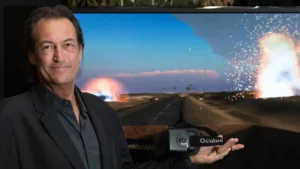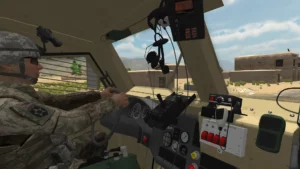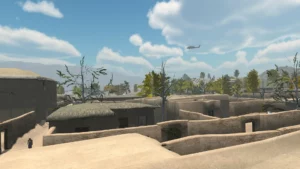Background
BRAVEMIND, ICT’s virtual reality (VR) exposure therapy system has been shown to produce a meaningful reduction in PTSD symptoms in multiple clinical trials across VA, DoD, and University-based clinical test sites. Exposure therapy, in which a patient – guided by a trained therapist – confronts and reprocesses their trauma memories through a retelling of the experience, has been endorsed as an “evidence-based” treatment for PTSD.
ICT researchers pioneered leveraging virtual reality (VR) to extend this treatment, enabling patients to experience a scenario within a virtual world, under very safe and controlled conditions. Most recently, in the largest randomized clinical trial to date (Difede, Rothbaum, Rizzo et al., 2022), BRAVEMIND was found to be equivalent to the best evidence-based PTSD treatment approach (Prolonged Exposure), and produced better outcomes in patients with co-morbid major depression. VR exposure therapy was also found to be preferred over traditional therapy by 76% of incoming patients in this trial.
This project has been funded by ONR, TATRC, USAMRMC and the Infinite Hero Foundation. Collaborators include JoAnn Difede, Weill Cornell Medical Center; Barbara Rothbaum, Emory University; Greg Reger, Veterans Affairs; Chris Meek, SoldierStrong Foundation; and Virtually Better, Inc.
Objectives
In addition to the visual stimuli presented in the VR head-mounted display, directional 3D audio, vibrations and smells are delivered into the simulation to provide enhanced fidelity of recall. Specially-trained clinicians control the stimulus presentation via a separate “Wizard of Oz” interface, and are in full audio contact with the patient at all times.
BRAVEMIND is a platform that can be adapted to deliver a variety of VR-based treatment scenarios and can be used to treat PTSD due to other non-combat trauma experiences. The original application consisted of a series of graphical renderings of Afghan and Iraqi city, village, mountain, and desert road environments, as well as scenarios relevant to combat medics. Further versions have provided a safe tool for conducting exposure therapy with patients having PTSD due to military sexual trauma. The most recent iteration was developed for survivors displaced by the war in Ukraine as a virtual metaverse space to provide a place to gather, share stories, and receive social support.
Results
BRAVEMIND has been distributed to over 170 clinical sites over its history and the partnership with the SoldierStrong Foundation now freely distributes the equipment and clinical training needed to establish a treatment site at VA medical centers and other sites that serve the needs of our Veterans, including Puget Sound VA, and Emory University.
Next Steps
USC ICT has now partnered with clinicians and VR developers in Ukraine to customize the BRAVEMIND content for relevance in the direct trauma-focused treatment of Ukrainians diagnosed with PTSD.
Published academic research papers are available here. For more information Contact Us


